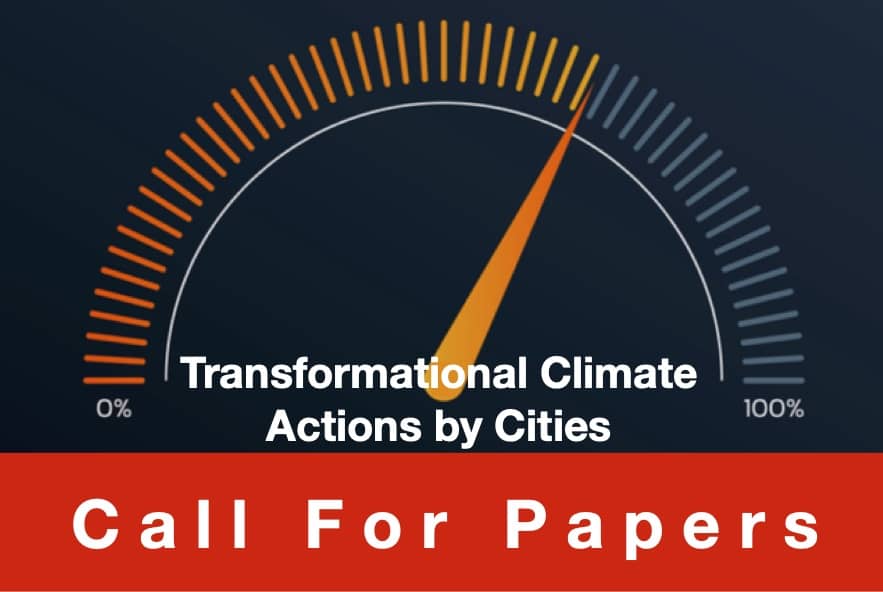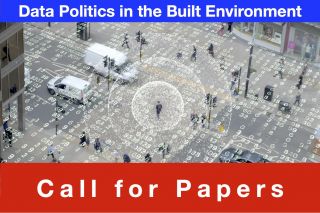
www.buildingsandcities.org/calls-for-papers/cfp-climate-cities.html
Transformational Climate Actions by Cities

Guest editors: John Robinson & Kim Slater (U Toronto)
Abstract submissions closed on 15 DECEMBER 2021
Are cities' implementation efforts achieving the transformation to realise low-carbon, climate resilient cities? What is the extent and effectiveness of these actions? How can implementation be accelerated?
With their predominantly coastal geographies, rapidly growing populations, and emissions-intensive activities, cities are highly vulnerable, as well as major contributors, to climate change. Fortunately, as "hubs of commerce, culture and innovation" (C40 Cities, 2021), cities are also promising sources of solutions. Taken together, these factors demand a closer examination of the progress and solutions that cities are making to mitigate climate change and adapt to its impacts.
In assessing progress, the focus of research to date has been on the content and quality of plans and strategies (Stevens et al., 2014; Horney et al., 2017), perhaps because they provide an accessible source of information on cities' climate activities (Otto et al., 2021). There is a growing tendency to align carbon reduction pledges with the Paris Agreements' recommendations for keeping global heating well below 2 oC, with some cities accelerating their targets (C40, 2019; New Climate Institue, 2019). Furthermore, there is evidence that such targets are increasingly connected to adaptation aims and other societal goals such as the UN Sustainable Development Goals (SDGs), with city-level climate action plans increasingly referencing commitments to achieving co-benefits in the realms of human and ecological health, equity, economic well-being and community resilience.
Such pledges and plans are important first steps; however, there is a need for implementation measures (e.g., policies, practices, programs etc.) that demonstrably advance climate mitigation and adaptation goals. As the City of Toronto notes, implementation will "bring about transformational changes in how we live, work, commute, and build." Such changes will require supportive policies, financial instruments and cooperation at all levels of government and across societal scales, as well as novel technologies, social innovations and practices. Yet research on the extent and effectiveness of cities' implementation efforts is underdeveloped. In particular, there is a need to better understand if and how cities are rolling out effective implementation measures, what effects (intended and unintended) such measures are having, and ultimately whether their implementation efforts are achieving the transformational changes needed to realize a low-carbon, climate resilient future.
In addition to actively seeking contributions from the research community, we also invite co-authored or joint contributions from members of academic institutions and representatives or staff of local governments to investigate:
- how they can evidence achieving their city's respective climate action plans (i.e. mitigation, adaptation / resiliency plans) &
- what progress has been made.
It is our hope that collaborating on a submission to this special issue will not only bring multiple perspectives to bear on the nature and degree of local implementation efforts and how to evaluate these, but also spur or enhance a multi-institutional arrangement between local governments and academic bodies that is supportive of climate action - now and in the future.
Suggested topics
From Target Setting and Planning to Implementation
- In what ways do targets inform implementation? Are these the right targets and how can they be evidenced? Are city goals or pledges meaningful given the share of emissions from goods and services used by the city occur outside the city boundary of which the city does not have control? Are interim / short-term targets helping municipalities stay on track and achieve their goals? What potential risks/ gains exist in setting stretch or "impossible" targets?
- What kinds of criteria and plans, or characteristics of plans, are essential for producing effective implementation measures and driving climate action?
- What climate considerations being integrated into other municipal planning and development processes - why and how is this being done?
Policies
- Are cities' climate pledges working in the absence of binding national regulations?
- What policies are needed to drastically and realistically reduce emissions and build climate resiliency within the urban built environment? What is needed for rapid adoption of such policies (e.g. building codes and adopting energy step codes, alternative governance instruments for buildings, carbon pricing, novel zoning and land use incentives)?
- How do climate policies connect to policies developed in other areas of municipal governance (e.g. land use, transportation, housing, employment, social services, etc.)? Is there an overall strategy for policy coordination? What are the barriers to civic and municipal integration?
Resources
- How are municipalities planning to or currently fund(ing) implementation? What novel funding mechanisms, fiscal instruments, and grant programs are needed or have been helpful for implementation, especially over the long run?
- What opportunities and constraints exist for municipalities regarding access to resources or funding implementation measures (e.g. size, geography, local capacity, political, economic and/or cultural factors)? To what degree has there been success in leveraging / overcoming these?
Implementation Programs, Projects, Experimentation & Participation
- What kinds of programs, projects and initiatives are effective at accelerating and upscaling urban climate action?
- How are issues of diversity, inclusion, and equity addressed, and how are they shaping implementation efforts? To what extent are dimensions of power explicitly engaged, and what effect are they having on local climate action? How are Indigenous approaches to partnership (e.g., Nation to Nation paradigms) and non-Western paradigms shaping implementation of climate plans, and to what end?
Learning, Experimentation and Assessment
- How are municipalities tracking progress toward their climate goals? To what degree are the assessment measures in place accurate, robust and driving action?
- What intended / unintended consequences are implementation efforts having?
- How is related learning driving or improving implementation, locally and beyond?
Such questions give rise to a secondary line of inquiry that looks across cities to explore the following dimensions of implementation:
Temporal and Spatial Scales
- How does city scale (population, area, economy, etc.) and other key characteristics influence their capabilities to act?
- How might smaller cities with similar characteristics pool their resources to act?
- How might productive multi-institutional and multi-actor relationships be nurtured long-term?
Social Learning & Evaluation
- How might rapid learning from the climate action unfolding in multiple urban settings be fostered and leveraged in service of spurring tipping points, scaling and accelerating climate action?
- How might evaluation support such learning and sharing? Specifically, what evaluation approaches enable a comparison of implementation efforts between cities?
- What insights emerge regarding the opportunities and constraints cities as a whole face in achieving their climate goals, and importantly, how can these become drivers of more effective implementation?
Briefing Note for Contributors
You are invited to submit an abstract for a journal paper in this special issue of Buildings & Cities. In the first instance, please send a 500 word (maximum) abstract defining the scope, methods and results to editor Richard Lorch richard@rlorch.net by 15 DECEMBER 2021
The initial submission needs to include:
- the author's and all co-author's names, affiliations and contact details
- the question(s) in this Call for Papers that the abstract and intended paper addresses
- the abstract (300 - 500 words maximum)
Abstracts will be reviewed by the editors to ensure a varied, yet integrated selection of papers around the topic of the special issue. Authors of accepted abstracts will be invited to submit a full paper (6000-7500 words including abstract and references), which will be subject to a double-blind review process.
Timeline
Deadline for abstract submission 15 December 2021
Full papers due 11 April 2022 (NB: authors can submit sooner if they wish)
Referees' comments July 2022
Final version due October 2022
Special issue publication January 2023 (NB: papers are published as soon as accepted)
About Buildings & Cities
Buildings & Cities is an international, open access, double-blind peer-reviewed research journal. Its focus is the interactions between buildings, neighbourhoods and cities by understanding their supporting social, economic and environmental systems. More information including its Aims & Scope and Editorial Board can be found online: www.buildingsandcities.org & published papers are found here: https://journal-buildingscities.org
Questions?
If you have a question, please contact: John Robinson johnb.robinson@utoronto.ca, Kim Slater kim.slater@mail.utoronto.ca or Richard Lorch richard@rlorch.net
References
C40 Cities Climate leadership Group and ARUP (2019). Deadline 2020. https://www.c40.org/researches/deadline-2020
C40 Cities (2021). C40 Annual Report. https://c40-production-images.s3.amazonaws.com/other_uploads/images/2827_C40_Annual_Report_2020_vMay2021_lightfile.original.pdf?1622806882
Guyadeen, D., Thistlethwaite, J. & Henstra, D. (2019). Evaluating the quality of municipal climate change plans in Canada. Climatic Change, 152, 121-143. https://doi.org/10.1007/s10584-018-2312-1
Horney, J., Nguyen, M., Salvesen, D., Dwyer, C., Cooper, J., & Berke, P. (2017). Assessing the quality of rural hazard mitigation plans in the southeastern United States. J Plan Educ Res, 37, 56-65. https://doi.org/10.1177/0739456X16628605
New Climate Institute, Data-Driven Lab, PBL, German Development Institute/Deutsches Institut für Entwicklungspolitik (DIE), Blavatnik School of Government, University of Oxford (2019). Global climate action from cities, regions and businesses: Impact of individual actors and cooperative initiatives on global and national emissions. 2019 edition. Research report prepared by the team of: Takeshi Kuramochi, Swithin Lui, Niklas Höhne, Sybrig Smit, Maria Jose de Villafranca Casas, Frederic Hans, Leonardo Nascimento, Paola Tanguy, Angel Hsu, Amy Weinfurter, Zhi Yi Yeo, Yunsoo Kim, Mia Raghavan, Claire Inciong Krummenacher, Yihao Xie, Mark Roelfsema, Sander Chan, Thomas Hale. https://newclimate.org/wp-content/uploads/2019/09/Report-Global-Climate-Action-from-Cities-Regions-and-Businesses_2019.pdf
Markolf, S., Azevedo, I.M.L., Muro, M., & Victor, D.G. (2020). Pledges and progress: Steps toward greenhouse gas emissions reductions in the 100 largest cities across the United States. Brookings Institute. https://www.brookings.edu/research/pledges-and-progress-steps-toward-greenhouse-gas-emissions-reductions-in-the-100-largest-cities-across-the-united-states/
Otto, A., Kern, K., Haupt, W., Eckersley, P., & Thieken, A.H., (2021) Ranking local climate policy: assessing the mitigation and adaptation activities of 104 German cities. Climatic Change, (167)5. https://doi.org/10.1007/s10584-021-03142-9
Purcell, B. (2019) TAF's review of Toronto's climate emergency declaration, The Atmospheric Fund [blog]. https://taf.ca/review-toronto-climate-emergency-declaration/
Stevens, M.R., & Shoubridge, J. (2015). Municipal hazard mitigation planning: a comparison of plans in British Columbia and the United States. J Environ Plan Manag, 58(11), 1988-2014. https://doi.org/10.1080/09640568.2014.973479
Latest Peer-Reviewed Journal Content
Urban verticalisation: typologies of high-rise development in Santiago
D Moreno-Alba, C Marmolejo-Duarte, M Vicuña del Río & C Aguirre-Núñez
A public theatre as a living lab to create resilience
A Apostu & M Drăghici
Reconstruction in post-war Rome: transnational flows and national identity
J Jiang
Reframing disaster recovery through spatial justice: an integrated framework
M A Gasseloğlu & J E Gonçalves
Tracking energy signatures of British homes from 2020 to 2025
C Hanmer, J Few, F Hollick, S Elam & T Oreszczyn
Spatial (in)justice shaping the home as a space of work
D Milián Bernal, J Laitinen, H Shevchenko, O Ivanova, S Pelsmakers & E Nisonen
Working at home: tactics to reappropriate the home
D Milián Bernal, S Pelsmakers, E Nisonen & J Vanhatalo
Living labs and building testing labs: enabling climate change adaptation
J Hugo & M Farhadian
Energy sufficiency, space temperature and public policy
J Morley
Living labs: a systematic review of success parameters and outcomes
J M Müller
Towards a universal framework for heat pump monitoring at scale
J Crawley, L Domoney, A O’Donovan, J Wingfield, C Dinu, O Kinnane, P O’Sullivan
Living knowledge labs: creating community and inclusive nature-based solutions
J L Fernández-Pacheco Sáez, I Rasskin-Gutman, N Martín-Bermúdez, A Pérez-Del-Campo
A living lab approach to co-designing climate adaptation strategies
M K Barati & S Bankaru-Swamy
Mediation roles and ecologies within resilience-focused urban living labs
N Antaki, D Petrescu, M Schalk, E Brandao, D Calciu & V Marin
Negotiating expertise in Nepal’s post-earthquake disaster reconstruction
K Rankin, M Suji, B Pandey, J Baniya, D V Hirslund, B Limbu, N Rawal & S Shneiderman
Designing for pro-environmental behaviour change: the aspiration–reality gap
J Simpson & J Uttley
Lifetimes of demolished buildings in US and European cities
J Berglund-Brown, I Dobie, J Hewitt, C De Wolf & J Ochsendorf
Expanding the framework of urban living labs using grassroots methods
T Ahmed, I Delsante & L Migliavacca
Youth engagement in urban living labs: tools, methods and pedagogies
N Charalambous, C Panayi, C Mady, T Augustinčić & D Berc
Co-creating urban transformation: a stakeholder analysis for Germany’s heat transition
P Heger, C Bieber, M Hendawy & A Shooshtari
Placemaking living lab: creating resilient social and spatial infrastructures
M Dodd, N Madabhushi & R Lees
Church pipe organs: historical tuning records as indoor environmental evidence
B Bingley, A Knight & Y Xing
A framework for 1.5°C-aligned GHG budgets in architecture
G Betti, I Spaar, D Bachmann, A Jerosch-Herold, E Kühner, R Yang, K Avhad & S Sinning
Net zero retrofit of the building stock [editorial]
D Godoy-Shimizu & P Steadman
Co-learning in living labs: nurturing civic agency and resilience
A Belfield
The importance of multi-roles and code-switching in living labs
H Noller & A Tarik
Researchers’ shifting roles in living labs for knowledge co-production
C-C Dobre & G Faldi
Increasing civic resilience in urban living labs: city authorities’ roles
E Alatalo, M Laine & M Kyrönviita
Co-curation as civic practice in community engagement
Z Li, M Sunikka-Blank, R Purohit & F Samuel
Preserving buildings: emission reductions from circular economy strategies in Austria
N Alaux, V Kulmer, J Vogel & A Passer
Urban living labs: relationality between institutions and local circularity
P Palo, M Adelfio, J Lundin & E Brandão
Living labs: epistemic modelling, temporariness and land value
J Clossick, T Khonsari & U Steven
Co-creating interventions to prevent mosquito-borne disease transmission in hospitals
O Sloan Wood, E Lupenza, D M Agnello, J B Knudsen, M Msellem, K L Schiøler & F Saleh
Circularity at the neighbourhood scale: co-creative living lab lessons
J Honsa, A Versele, T Van de Kerckhove & C Piccardo
Positive energy districts and energy communities: how living labs create value
E Malakhatka, O Shafqat, A Sandoff & L Thuvander
Built environment governance and professionalism: the end of laissez-faire (again)
S Foxell
Co-creating justice in housing energy transitions through energy living labs
D Ricci, C Leiwakabessy, S van Wieringen, P de Koning & T Konstantinou
HVAC characterisation of existing Canadian buildings for decarbonisation retrofit identification
J Adebisi & J J McArthur
Simulation and the building performance gap [editorial]
M Donn
Developing criteria for effective building-sector commitments in nationally determined contributions
P Graham, K McFarlane & M Taheri
Join Our Community

The most important part of any journal is our people – readers, authors, reviewers, editorial board members and editors. You are cordially invited to join our community by joining our mailing list. We send out occasional emails about the journal – calls for papers, special issues, events and more.
We will not share your email with third parties. Read more



Latest Commentaries
COP30 Report
Matti Kuittinen (Aalto University) reflects on his experience of attending the 2025 UN Conference of the Parties in Belém, Brazil. The roadmaps and commitments failed to deliver the objectives of the 2025 Paris Agreement. However, 2 countries - Japan and Senegal - announced they are creating roadmaps to decarbonise their buildings. An international group of government ministers put housing on the agenda - specifying the need for reduced carbon and energy use along with affordability, quality and climate resilience.
Building-Related Research: New Context, New Challenges
Raymond J. Cole (University of British Columbia) reflects on the key challenges raised in the 34 commissioned essays for Buildings & Cities 5th anniversary. Not only are key research issues identified, but the consequences of changing contexts for conducting research and tailoring its influence on society are highlighted as key areas of action.